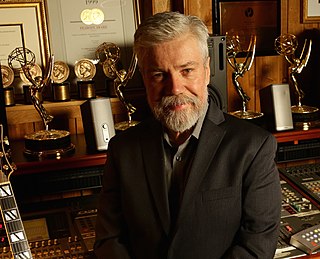Related Research Articles
Frontline is an investigative documentary program distributed by the Public Broadcasting Service (PBS) in the United States. Episodes are produced at WGBH in Boston, Massachusetts. The series has covered a variety of domestic and international issues, including terrorism, elections, environmental disasters, and other sociopolitical issues. Since its debut in 1983, Frontline has aired in the U.S. for 42 seasons, and has won critical acclaim and awards in broadcast journalism. In 2024, Frontline won its first Oscar at the 96th Academy Awards for Best Documentary Feature, 20 Days in Mariupol, made by a team of AP Ukrainian journalists. Frontline has produced over 800 documentaries from both in-house and independent filmmakers, 200 of which are available online.
Nova is an American popular science television program produced by WGBH in Boston, Massachusetts, since 1974. It is broadcast on PBS in the United States, and in more than 100 other countries. The program has won many major television awards.

The Civil War is a 1990 American television documentary miniseries created by Ken Burns about the American Civil War. It was the first broadcast to air on PBS for five consecutive nights, from September 23 to 27, 1990.

Baseball is a 1994 American television documentary miniseries created by documentary filmmaker Ken Burns about the history of the sport of baseball.
Eyes on the Prize: America's Civil Rights Movement is an American television series and 14-part documentary about the 20th-century civil rights movement in the United States. The documentary originally aired on the PBS network, and it also aired in the United Kingdom on BBC2. Created and executive produced by Henry Hampton at his film production company Blackside, and narrated by Julian Bond, the series uses archival footage, stills, and interviews by participants and opponents of the movement. The title of the series is derived from the title of the folk song "Keep Your Eyes on the Prize", which is used as the opening theme music in each episode.
People's Century is a television documentary series examining the 20th century. It was a joint production of the BBC in the United Kingdom and PBS member station WGBH Boston in the United States. The series was first shown on BBC in the 1995, 1996 and 1997 television seasons before being broadcast in the US and elsewhere in the world in 1998.

Nic Robertson is the international diplomatic editor of CNN.

ITVS is a service in the United States which funds and presents documentaries on public television through distribution by PBS and American Public Television, new media projects on the Internet, and the weekly series Independent Lens on PBS. Aside from Independent Lens, ITVS funded and produced films for more than 40 television hours per year on the PBS series POV, Frontline, American Masters and American Experience. Some ITVS programs are produced along with organizations like Latino Public Broadcasting and KQED.

POV is a Public Broadcasting Service (PBS) public television series which features independent nonfiction films. POV is an initialism for point of view.

Hedrick Smith is a Pulitzer Prize-winning former New York Times reporter and Emmy award-winning producer and correspondent. After serving 26 years with The New York Times from 1962-88 as correspondent, editor and bureau chief in both Moscow and Washington, Smith moved into television in 1989, reporting and producing more than 50 hours of long-form documentaries for PBS over the next 25 years on topics from the inside story of the terrorists who mounted the 9/11 attacks and Gorbachev's perestroika to Wall Street, Walmart and The Democracy Rebellion of grassroots citizen reform movements. Smith has authored five best-selling books including The Russians, The Power Game: How Washington Works, and Who Stole the American Dream?, and co-authored several other books, including The Pentagon Papers and Reagan: The Man, the President. Smith is currently Executive Editor of the website ReclaimTheAmericanDream.org and the YouTube channel The People vs. The Politicians.

Ric Burns is an American documentary filmmaker and writer. He has written, directed and produced historical documentaries since the 1990s, beginning with his collaboration on the celebrated PBS series The Civil War (1990), which he produced with his older brother Ken Burns and wrote with Geoffrey Ward.

Jay Murray Winter is an American historian. He is the Charles J. Stille Professor of History at Yale University, where he focuses his research on World War I and its impact on the 20th century. His other interests include remembrance of war in the 20th century, such as memorial and mourning sites, European population decline, the causes and institutions of war, British popular culture in the era of the First World War, and the Armenian genocide of 1915. He is completing a biography of René Cassin.
James Andrew Laurie is an American writer, journalist, and broadcaster who is known principally for his work in Asia.
Color Adjustment is a 1992 documentary film that traces 40 years of race relations and the representation of African Americans through the lens of prime-time television entertainment, scrutinizing television's racial myths. Narrated by Ruby Dee, it is a sequel to Riggs’s Ethnic Notions, this time examining racial stereotypes in the broadcast age.
Andrew Goldberg is an American producer and director and is the founder and owner of So Much Film in New York City. An Emmy Award winner, Goldberg's credits include producing/directing documentaries and news and long-form programming for PBS, ABC News, MSNBC and many others. His works include public affairs, history, and current events, with projects focusing on topics such as the Armenian genocide and contemporary anti-Semitism.

Nature is a wildlife television program produced by Thirteen/WNET New York. It has been distributed to United States public television stations by the PBS television service since its debut on October 10, 1982. Some episodes may appear in syndication on many PBS member stations around the United States and Canada, and on the Discovery Channel. This series currently airs on Wednesday on PBS.

Brian Keane is an American composer, music producer, and guitarist. Keane has been described as "a musician's musician, a composer's composer, and one of the most talented producers of a generation" by Billboard magazine.
Coming Out Under Fire is a 1994 documentary film directed and produced by Arthur Dong and narrated by actress Salome Jens. Based on Allan Bérubé's book of the same title, the film examines the attitudes toward homosexuality in the United States Armed Forces during World War II.
Carl Byker is the founder of Red Hill Productions and an American television producer, writer, and director. He has written, directed and produced multiple hours for the PBS series Frontline and American Experience." He has also made 12 limited series and science specials for PBS. Among his awards are the 1997 Prime-Time Emmy Award for The Great War and the Shaping of the 20th Century in the category of Outstanding Informational Series, the Peabody Award, two Alfred I. duPont–Columbia University Award silver batons, two International Documentary Association awards for best limited series, the Investigative Reporters and Editors award for best multi-platform’ project of the year for a collaboration with NPR, Pro Publica and Frontline. Carl’s films have also been nominated six times by the Writers Guild of America for best non-fiction television script of the year and have won the award twice.
Jacoba Atlas is an American executive producer in television, also publishing as a journalist, music critic, novelist, screenwriter and documentary filmmaker. She won a Peabody Award, an Emmy Award and a CableACE Award for Survivors of the Holocaust (1996), a TV documentary made for TBS.
References
- ↑ Hunt, G. W. (1996). "Of many things". America. 175 (14): 2.
- ↑ Stansky, Peter (1997). "Film reviews - The Great War and the Shaping of the 20th Century". American Historical Review. 102 (2): 593–594. doi:10.2307/2171055. JSTOR 2171055.
- 1 2 Niemi, Robert (2013). Inspired by True Events: An Illustrated Guide to More than 500 History-based Films (2nd ed.). Santa Barbara, CA: ABC-CLIO. pp. 75–77. ISBN 9781610691970.
- ↑ Cigognetti, L. and Sorlin, P. (2010) "History on Television: The Problem of Sources" in Bell, E. and Gray, A. [eds] Televising History: Mediating the Past in Postwar Europe, New York: Palgrave Macmillan.
- ↑ Stuttaford, Genevieve (1996). "The Great War and the Shaping of the 20th Century". Publishers Weekly. 243 (43): 63.